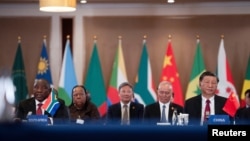The BRICS bloc of developing nations agreed on Thursday to admit Saudi Arabia, Iran, Ethiopia, Egypt, Argentina and the United Arab Emirates in a move aimed at accelerating its push to reshuffle a world order it sees as outdated.
In deciding in favor of an expansion, the bloc's first in 13 years, BRICS leaders left the door open to future enlargement as dozens more countries voiced interest in joining a grouping they hope can level the global playing field.
The expansion adds economic heft to BRICS, whose current members are China, the world's second largest economy, as well as Brazil, Russia, India and South Africa. It could also amplify its declared ambition to become a champion of the Global South.
But long-standing tensions also could linger between members who want to forge the grouping into a counterweight to the West — notably China, Russia and now Iran — and those that continue to nurture close ties to the United States and Europe.
"This membership expansion is historic," Chinese President Xi Jinping, the bloc's most stalwart proponent of enlargement, said. "It shows the determination of BRICS countries for unity and cooperation with the broader developing countries."
The six new candidates will formally become members on January 1, 2024, South African President Cyril Ramaphosa said when he named the countries during a three-day leaders' summit he is hosting in Johannesburg.
"BRICS has embarked on a new chapter in its effort to build a world that is fair, a world that is just, a world that is also inclusive and prosperous," Ramaphosa said.
"We have consensus on the first phase of this expansion process and other phases will follow."
The countries invited to join reflect individual BRICS members' desires to bring allies into the club.
Brazilian President Luiz Inacio Lula da Silva had vocally lobbied for neighbor Argentina's inclusion, while Egypt has close commercial ties with Russia and India.
The entry of oil powers Saudi Arabia and UAE highlights their drift away from the United States' orbit and ambition to become global heavyweights.
Russia and Iran have found common cause in their shared struggle against U.S.-led sanctions and diplomatic isolation, with their economic ties deepening in the wake of Moscow's invasion of Ukraine.
"BRICS is not competing with anyone," Russia's Vladimir Putin said on Thursday. He is attending the summit remotely because of an international warrant for alleged war crimes. "But it's also obvious that this process of the emerging of a new world order still has fierce opponents."
Iran's President Ebrahim Raisi celebrated his country's BRICS invitation with a swipe at Washington, saying on Iranian television network Al Alam that the expansion "shows that the unilateral approach is on the way to decay."
Beijing is close to Ethiopia and the country's inclusion also speaks to South Africa's desire to amplify Africa's voice in global affairs.
United Nations Secretary-General Antonio Guterres attended Thursday's expansion announcement, reflecting the bloc's growing influence. He echoed BRICS' longstanding calls for reforms of the U.N. Security Council, International Monetary Fund and World Bank.
"Today's global governance structures reflect yesterday's world," he said. "For multilateral institutions to remain truly universal, they must reform to reflect today's power and economic realities."
BRICS countries have economies that are vastly different in scale and governments with often divergent foreign policy goals, a complicating factor for the bloc's consensus decision-making model.
Though home to about 40% of the world's population and a quarter of global gross domestic product, internal divisions have long hobbled BRICS ambitions of becoming a major player on the world stage.
It has long been criticized for failing to live up to its grand ambitions.
The regularly repeated desire of its member states to wean themselves off the dollar, for example, has never materialized. And its most concrete achievement, the New Development Bank, is now struggling in the face of sanctions against founding shareholder Russia.
Even as BRICS leaders this week weighed expanding the group — a move every one of them publicly supported — divisions surfaced over how much and how quickly.
Last-minute deliberations over entry criteria and which countries to invite to join extended late into Wednesday evening.





